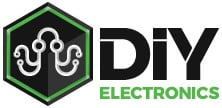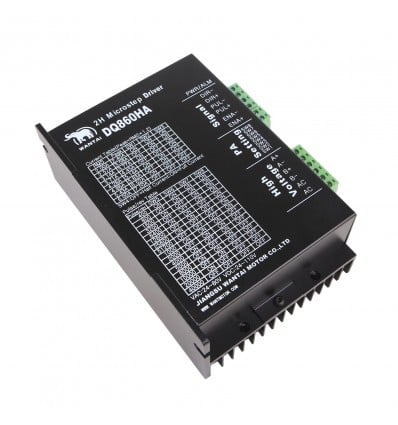International shipping Secure payment
No products
Prices are tax included
Product successfully added to your shopping cart
There are 0 items in your cart. There is 1 item in your cart.
DQ860HA Stepper Motor Driver – 7.2A
9MDTM860HA
New
The DQ860HA Stepper Motor Driver is a 2-phase hybrid stepping motor driver made with smooth operation, low noise and low heat for 3D Printers and CNC Projects.
This product is no longer in stock
Free shipping on orders over R1250 - courier delivery and within South Africa
To utilize the wonders of quality Stepper Motors for your Tinkerer Projects, you will need something to drive that magical smoke into them. Stepper Motor Drivers are the regulators behind the curtain and this beefy DQ860HA Stepper Motor Driver is a powerful 2-phase hybrid stepping motor driver with up to 7.2A peak. Whether operated from a dedicated CNC Controller Board, or simply from a little microcontroller like an Arduino Board, the DQ860HA Stepper Motor Driver is the device to convert pulse signals from a controller into motor motion and achieve precise positioning for high voltage Stepper Motors.
Built to offer smooth operation with low noise and low heat, these DQ860HA Stepper Motor Drivers feature micro stepping up to 1/256th step. Although not incredibly fast, these motor drivers have an impressive precision that is ideal for the use in 3D Printers, laser cutting machines, and other automated CNC Projects. The DQ860HA Stepper Motor Driver also features the latest 32-bit digital processing technology in which its advanced control algorithms are capable of converting variable currents and frequency.
The DQ860HA Stepper Motor Driver comes with an automatic anti-overheating mechanism called a semi-flow function, in which it reduces the current of the circuit to 70% when no signals have been received for 500ms. Additionally, it is recommended to leave about 20mm of space around the unit clear, so as to ensure efficient heat dispersion and to avoid heat-related problems.
The DQ860HA has been designed to work perfectly with the NEMA17, NEMA23, NEMA34, and NEMA42 stepper motors.
DQ860HA Stepper Motor Driver - Technical Specifications: |
|
|
– Wantai |
|
– DQ860HA |
|
– 24 to 110V DC, or 18 to 80V AC |
|
– 2.1A to 7.2A Peak |
|
– 7 to 20mA |
|
– 0 to 100KHz |
|
– 16 |
|
– Semi-Flow function reduces output current to 70% |
|
– Overvoltage; Under-voltage; Overcurrent |
|
– Low heat generation – Low motor vibration – Optional Idle-Current Reduction – Smooth operation and low noise – Built-in micro-segmentation – Integrated parameter power-on auto-tuning function |
|
– 0°C to 70°C – Avoid dust and corrosive gas |
|
– -20°C to +80°C – Avoid direct sunlight |
|
– 500g |
|
– 15 x 11 x 5.5cm |
Connector Pin Assignments and Descriptions: |
|
PIN FUNCTION |
DETAILS |
|
Enable Signal EN- | EN+ |
EN- is the Negative of the Enable Input – Cathode EN+ is the Positive of the Enable Input – Anode |
|
DIR Signal DIR- | DIR+ |
DIR- is the Negative of Direction Input – Cathode DIR+ is the Positive of Direction Input – Anode |
|
Pulse Signal PUL- | PUL+ |
PUL- is the Negative of Pulse Input – Cathode PUL+ is the Positive of Pulse Input – Anode |
|
Motor Coil A A+ | A- |
A+ is the Positive Connection – Anode A- is the Negative Connection – Cathode |
|
Motor Coil B B+ | B- |
B+ is the Positive Connection – Anode B- is the Negative Connection – Cathode |
|
Power Supply GND | VCC |
+V: Power supply, 24 to 110V DC or 18 to 80V AC Including voltage fluctuation and EMF voltage |
|
Power Input AC | AC |
Standard Power Terminals – 18 to 80V AC First AC port is positive, and second AC port is negative |
DIP Pins SW1 to SW3: DIP Switch Settings Chart
Each different type of motor will have different current input requirements, which is why the SW1, SW2 and SW3 DIP switches are designed to adjust output current. When setting these, try to accommodate your motors’ requirements as closely as possible.
|
SW1 |
ON |
OFF |
ON |
OFF |
ON |
OFF |
ON |
OFF |
|
SW2 |
ON |
ON |
OFF |
OFF |
ON |
ON |
OFF |
OFF |
|
SW3 |
ON |
ON |
ON |
ON |
OFF |
OFF |
OFF |
OFF |
|
PEAK(A) |
Default[2.0A] |
3.08A |
3.77A |
4.45A |
5.14A |
5.83A |
6.52A |
7.20A |
|
RMS(A) |
Default[2.0A] |
2.57A |
3.14A |
3.71A |
4.28A |
4.86A |
5.43A |
6.00A |
SW4: The quiescent current can be set by the SW4 dial switch. OFF means that the quiescent current is set to half of the dynamic current. ON means that the quiescent current is the same as the dynamic current.
DIP Pins SW5 to SW8: Microsteps Settings Chart:
Micro step resolution is set by SW5, SW6, SW7, and SW8 on the DQ860HA Stepper Motor Driver. From its 16 microsteps, this driver features up to 1/256th step. The last four DIP switches define the amount of steps that the motor must take per revolution, and essentially dictates the speed and torque as well. The following chart shows all the options available and what settings SW5, SW6, SW7, and SW8 need to be in to achieve desired revolutions-per-minute.
|
RPM |
400 |
800 |
1600 |
3200 |
6400 |
12800 |
25600 |
51200 |
1000 |
2000 |
4000 |
5000 |
8000 |
10000 |
20000 |
40000 |
|
SW5 |
ON |
OFF |
ON |
OFF |
ON |
OFF |
ON |
OFF |
ON |
OFF |
ON |
OFF |
ON |
OFF |
ON |
OFF |
|
SW6 |
ON |
ON |
OFF |
OFF |
ON |
ON |
OFF |
OFF |
ON |
ON |
OFF |
OFF |
ON |
ON |
OFF |
OFF |
|
SW7 |
ON |
ON |
ON |
ON |
OFF |
OFF |
OFF |
OFF |
ON |
ON |
ON |
ON |
OFF |
OFF |
OFF |
OFF |
|
SW8 |
ON |
ON |
ON |
ON |
ON |
ON |
ON |
ON |
OFF |
OFF |
OFF |
OFF |
OFF |
OFF |
OFF |
OFF |
DQ860HA Stepper Motor Driver Troubleshooting Chart
If you experience any problems relating to the DQ860HA Stepper Motor Driver, refer to this basic troubleshooting chart. It lists some of the most common problems, as well as possible solutions. If you still can’t figure out what the problem may be, however, contact us at DIYElectronics for friendly and insightful customer service.
Alarm Indicator |
Reasons |
Measures |
|
LED off turn |
Wrong connection for power |
Check wiring of power |
|
Low-voltages for power |
Enlarge voltage of power |
|
|
Motor doesn’t run, without holding torque |
Wrong connection of stepper motor |
Correct its wiring |
|
RESET signal is effective when offline |
Make RESET ineffective |
|
|
Motor doesn’t run, but maintains holding torque |
Without input pulse signal |
Adjust PMW & signal level |
|
Motor runs wrong direction |
Wrong wires’ connection |
Change connection for any of 2 wires |
|
Wrong input direction signal |
Change direction setting |
|
|
Motor’s holding torque is too small |
Too small relative to current setting |
Correct rated current setting |
|
Acceleration is too fast |
Reduce the acceleration |
|
|
Motor stalls |
Rule out mechanical failure |
|
|
Driver does not match with the motor |
Change a suitable driver |
No customer reviews for the moment.






